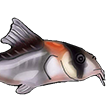I thought about putting this in the tank talk section but it seems a bit trivial to put it there.
Most of my tanks are community tanks (unless I'm trying to spawn a type of fish that's small enough to go into a 10 gallon or 20 gallon tank). In most of the tanks the fish are of similar temperament in terms of shyness (any dither fish notwithstanding) and willingness to feed (in some tanks all the fish disappear behind decor as soon as they see me, sneaking out again after a decent interval, and in some tanks they're all there begging to be fed).
However, in my 5' 150 gallon aquarium, some fish are more successful at wolfing down vast quantities of food in very short order, whilst others chew desperately at food just hoping there's something left for them after they've finished the piece they're on. Because of the size of most of the fish, I feed more pellets than other foods, with some flake to make sure the smaller fish get something, and occasional frozen foods. The pellets are either small sinking hard pellets e.g. JMC catfish pellets, or pre-soaked floating koi pellets (the reasoning being that the tilapia, barbs, Distichodus and even Geophagus require a more vegetable-based diet than typical tropical fish. I also try to feed small amounts separated by 30 minutes or so rather than just feed the whole lot in one go. Despite this, the Synodontis euptera spends most days looking like a football, as she upends on the water surface and literally just swallows everything that goes into her mouth (the barbs and Tilapia tend to as well), whereas the poor hoplos and Callichthys struggle to chew even very soft, small food. As such, some of my fish eat a hugely disproportionate amount of the food offered. My P. gibbiceps also struggles to juggle pellets, but at least he/she gets fed courgette/cucumber several times a week.
If necessary I can target feed the hoplos/Callichthys as they will hand-feed for bloodworm, but short of trying to shoo away the syno (not easily done as she shows zero fear of me, and not something I want to do either) every times she comes out to feed, how do I stop her overfeeding?
Community tanks and greedy fish
- Carp37
- Posts: 596
- Joined: 21 Sep 2007, 13:08
- My cats species list: 16 (i:7, k:0)
- My aquaria list: 7 (i:6)
- My BLogs: 2 (i:0, p:51)
- Location 2: Aughton UK
- Interests: fish, fishing, fossils, evolution/taxonomy, films
Community tanks and greedy fish
Megalechis thoracata, Callichthys callichthys, Brochis splendens (and progeny), Corydoras sterbai, C. weitzmani, CW044 cf. pestai, CW021 cf. axelrodi, Pterygoplichthys gibbiceps, Ancistrus cf. cirrhosus (and progeny), Panaque maccus, Panaque nigrolineatus, Synodontis eupterus
-
Bas Pels
- Posts: 2920
- Joined: 21 Dec 2006, 20:35
- My images: 1
- My cats species list: 28 (i:0, k:0)
- Spotted: 8
- Location 1: the Netherlands
- Location 2: Nijmegen the Netherlands
- Interests: Central American and Uruguayan fishes
Re: Community tanks and greedy fish
Although I never read about this specific problem, I do know that combining fish from different continents MAY have adverse results. Being used to American cich lids and other fish, I'm thinking mostly about agression, and fish not understanding each others submissive behaviour, but motre problems arise
Currently I'm helping a friend with some of his fishes, while he moves house. As stated, I only have American fish, and his fish are african - Synodontus. I can only say - boy, how differnet they behave - in separate tanks.
They use pipes different from what I'm used to, fight different, are more sesillient then I thought was possible (yes, being unexperienced with them, the fighting resulted in damage)
To summarise the whole, my 30+ years of experience with american fish is of remarcably little value with these fishes - they are so different
I think your American fishes are as astounded by the african one(s) as I am
That is why I always advise to keep continents separated, better still ,to combine only fish which may encounter eaxch other in nature
Currently I'm helping a friend with some of his fishes, while he moves house. As stated, I only have American fish, and his fish are african - Synodontus. I can only say - boy, how differnet they behave - in separate tanks.
They use pipes different from what I'm used to, fight different, are more sesillient then I thought was possible (yes, being unexperienced with them, the fighting resulted in damage)
To summarise the whole, my 30+ years of experience with american fish is of remarcably little value with these fishes - they are so different
I think your American fishes are as astounded by the african one(s) as I am
That is why I always advise to keep continents separated, better still ,to combine only fish which may encounter eaxch other in nature
cats have whiskers




